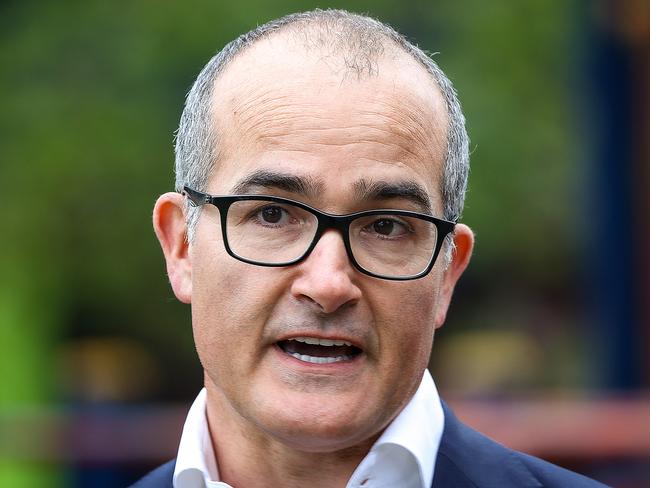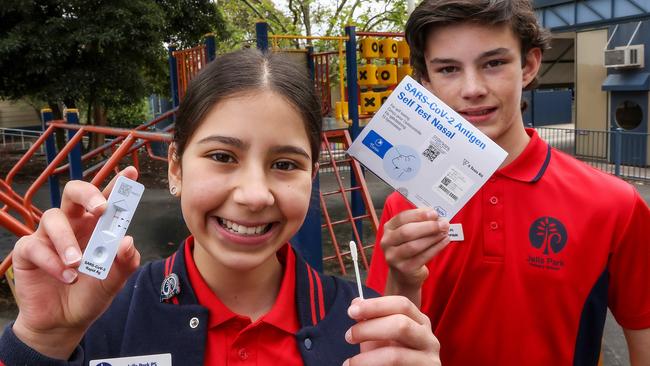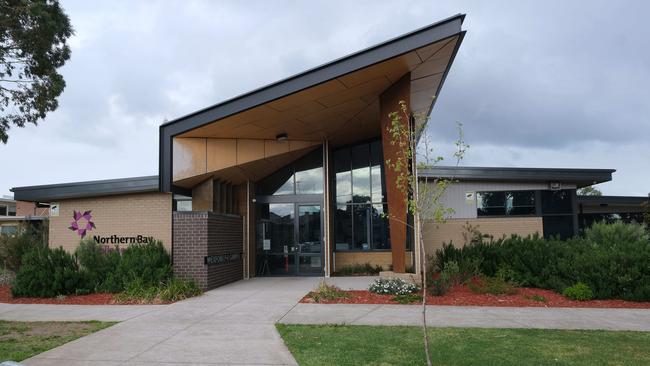Isolation change for Covid-hit schools; vaccine for younger kids delayed
Australia will take a “cautious” approach to the approval of Covid vaccines for children aged five to 11 years, Scott Morrison says.
Coronavirus
Don't miss out on the headlines from Coronavirus. Followed categories will be added to My News.
Australia will take a “cautious” approach to the approval of Covid vaccines for children aged five to 11 years, Prime Minister Scott Morrison says.
The Herald Sun on Monday revealed that children in that age group face waiting until early next year for a shot, despite previous hopes they would be protected by the end of the school term.
The nation’s drug regulator and expert immunisation panel are yet to form advice about Covid vaccines for kids.
“We need to be very careful, we need to be very cautious,” Mr Morrison said. “We won’t be authorising a vaccination arrangement for children aged five to 11 until the medical experts say it’s safe.”
Victorian Education Minister James Merlino said it was “disappointing” that vaccines were not expected to be approved this year.
“The Prime Minister did indicate at national cabinet on Friday that vaccines won’t be available by Christmas,” Mr Merlino said, adding they had wanted them before Christmas.
“That’s what we were, frankly, expecting,” he said.

But infectious diseases specialist Nick Coatsworth is urging authorities to get as much data as possible before commencing kids’ vaccinations.
The comments come after national cabinet was told the US decision to approve Pfizer for five to 11 year olds was based on a sample of 3000 people.
“We don’t want to be the second country in the world to approve kid’s vaccines after the United States,” Dr Coatsworth said.
Health Minister Greg Hunt said the Therapeutic Goods Administration was assessing Pfizer’s incomplete application “quickly but absolutely thoroughly”.
He said the Australian Technical Advisory Group on Immunisation would also review the evidence over the “next six to seven weeks”.
“We are ready if there is a yes,” Mr Hunt said.
Pfizer’s Covid vaccine for children contains the same ingredients as the adult vaccine, but it is a third of the dose.
This means it may require a different sized vial – so existing supply would not be used.
Australia has a provision for pediatric vaccines in its supply deal with Pfizer.
If the TGA approves the vaccine, the government can then put in its order with Pfizer.
It is then expected that supply would arrive in Australia by the time ATAGI made its recommendation on the vaccine program.
Moderna is due to submit an application for its Covid-19 vaccine to be given to children in the next fortnight. It plans to use the same vials for both adult and child doses.
Mr Merlino said the federal government was yet to confirm to states that they had enough vaccine for children.
BIG CHANGE FOR HOT SPOT SCHOOLS
Unvaccinated Victorian students identified as primary close contacts can now return to school after seven days of isolation by using rapid antigen testing at home.
The statewide rollout of 200,000 at-home rapid antigen tests comes as it can be revealed 36 of the state’s 53 major outbreaks are in schools and childcare centres.
These include high case numbers at educational institutions in Geelong, Traralgon, Templestowe and Morwell.
Rapid tests will be used to get children back to class more quickly, with isolating students cleared from quarantine on day six after returning a standard negative test.
They will then be required to take a rapid test at home each morning before school on days eight to 14.
The government announced the relaxation of the isolation rules for unvaccinated students a day after questions from the Herald Sun, which on Monday revealed children aged five to 11 were unlikely to become eligible for the vaccine until next year.
It prompted concerns that those students deemed close contacts would be forced to miss two weeks of school because they were unvaccinated.

The isolation requirements are the latest in a series of Covid rule changes made after issues have been raised in the Herald Sun.
Doherty Institute modelling released on Monday shows this “test to stay” approach can be just as effective as two weeks of quarantine in preventing wider outbreaks.
Dr Nick Scott, the head of modelling and biostatistics at the Burnet Institute, said research showed there were no further transmissions, or fewer than five infections, in half of all school outbreaks.

The modelling showed that twice-weekly testing of students using rapid antigen testing “markedly increases the chances of nipping an outbreak in the bud”.
Such testing can reduce “both the probability that there was an outbreak as well as the number of downstream infections that we observed,” Dr Scott said.
“It makes a lot of sense because you do cut off the infectious days spent in school by catching them in the morning before students go to school.”
The modelling also showed that in 37 per cent of cases in primary schools and 47 per cent of cases in high schools, infected students do not lead to any further cases.
But a third of cases can lead to 20 or more infections – or even up to 50 – without further measures to detect and isolate positive cases.

Mr Merlino said that having to quarantine was “frustrating” for all involved.
He said the rapid antigen testing was “just another way, another mitigation measure, to make our schools safer, but at the same time, minimise disruption to our kids and to our school communities”.
Twenty schools with outbreaks will get the rapid tests immediately, as will the rest of the state by November 15. Vaccinated students will still only have to isolate for seven days.
Opposition Education spokesman David Hodgett said the test-to-stay policy should replace the seven days of quarantine.
“This is a much more effective way of managing Covid-positive cases so that more kids can stay in school,” he said.
Gail McHardy, executive officer of Parents Victoria, said she welcomed rapid antigen testing and that it provided “further confidence” in the decision to allow students an earlier return to school.
THE SCHOOLS AMONG OUR BIGGEST HOT SPOTS
Victorian schools and childcare centres in Geelong, Traralgon, Templestowe and Morwell are the sites of some of the biggest Covid outbreaks in the state, the Herald Sun can reveal.
Locations that have not been widely known as having cases – let alone major outbreaks – include the Northern Bay College Wexford Campus in Corio, which now has 56 cases and Stockdale Road Primary School in Traralgon, which has 31.
Other educational facilities with large case numbers linked to them include Morwell Park Primary, which has 30, Bacchus Marsh Childcare and Kinder with 30 cases, and Templestowe Park Primary, which has 29 infections.
Of the 49 major outbreaks, 34 are in educational settings.
The government figures come as Professor Allen Cheng has warned Australian children aged five to 11 may not get vaccinated until the start of next year. This means most children will continue wearing masks and miss school for two weeks if they are exposed to the virus.
The high number of unvaccinated children at schools and childcare centres have led to the virus spreading in such locations, although children do not generally get sick.
Other sites include 28 cases at Wodonga South Primary School, 27 at St Joseph’s School Quarry Hill and 23 at Hazelwood North Primary.
The list only includes outbreaks with ten or more cases.
The Committee for Public Education is reporting 469 schools have been closed this term alone, and 18 schools and 119 childcare centres are closed or partially closed on Monday.
Closed schools include Berwick Primary, Cranbourne East Primary, Dromana Primary, Copperfield College and Sunshine Special School.
Read related topics:Scott Morrison




